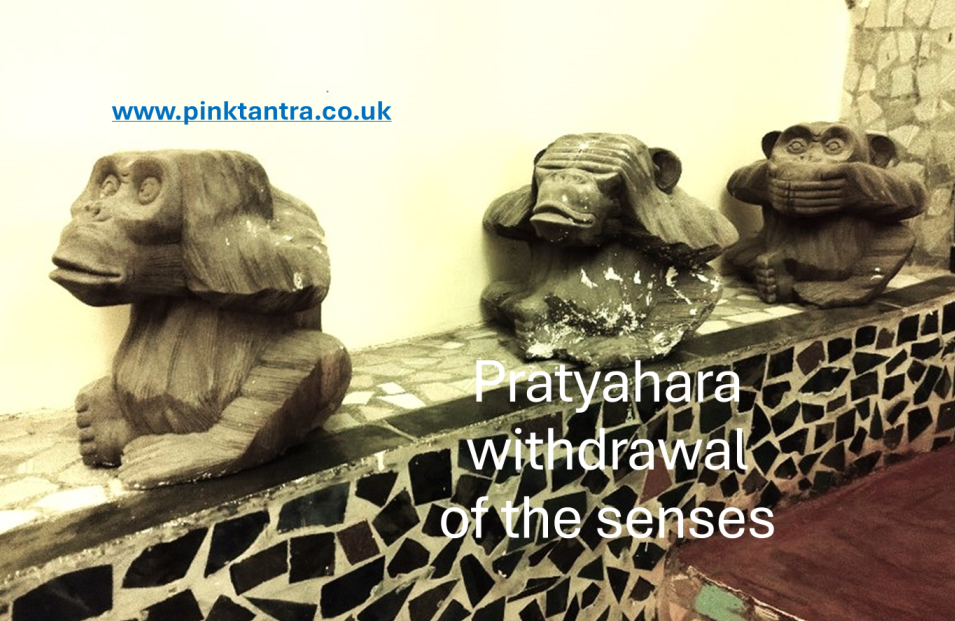Pratyahara - withdrawal of the senses
The practice of Pratyahara prepares us for the ultimate steps on the yogic path. It helps us to learn to control our unruly senses that are all over the place, responding to all the suggestions the outside world is continuously giving us. It is the turning point for those truly on the spiritual path.
 In an earlier post Tantra and the Yoga Sutras I wrote about Patanjali’s 8 Limbs of Yoga. The Yamas are the principles of self-regulation to de-programme our mental patterns. The Niyamas are the principles of self-training to help us reprogramme our mind to attune to universal intelligence. Asana is the practice of developing a stable and relaxed body. Pranayama is the practice of breathwork. Pratyahara is when the mind is drawn inwards, away from the senses. Dharana is one-pointed focus of our awareness through effort. Dhyana is effortless concentration. Samadhi comes when the mind is truly absorbed, experiencing pure consciousness.
In an earlier post Tantra and the Yoga Sutras I wrote about Patanjali’s 8 Limbs of Yoga. The Yamas are the principles of self-regulation to de-programme our mental patterns. The Niyamas are the principles of self-training to help us reprogramme our mind to attune to universal intelligence. Asana is the practice of developing a stable and relaxed body. Pranayama is the practice of breathwork. Pratyahara is when the mind is drawn inwards, away from the senses. Dharana is one-pointed focus of our awareness through effort. Dhyana is effortless concentration. Samadhi comes when the mind is truly absorbed, experiencing pure consciousness.
With our Asana and Pranayama we create the foundation within ourselves to consciously choose and as we embark on the practice of Pratyahara we dedicate ourselves to strengthen our ‘container’ and so hold larger amounts of energy (energy that would normally be leaked out through the senses) thereby becoming more skilled in keeping our senses in check and thus calming the mind.
Pratyahara is fundamental to stepping into a whole other level of managing your life and really considering your inner world as important, if not more important, than the world around you. Taking this into consideration it makes sense that for many yogis Pratyahara is actually their most important practice (or limb) on the Eightfold Path.
Recognising Pratyahara in this context got me to thinking about how the Yamas and Niyamas might relate to my behaviour.
For the Yamas, if we are not in control of how we respond to our senses we can end up reacting, thereby harming others and ourselves (ahimsa is non-harming). Likewise, if we are to recognise the truth of who we are as spirit, then our senses need to be in service not in control (satya is truthfulness). However, if we are merely following our senses we are stealing from our truth (asteya), just as if we are following our compulsions we are not living in moderation (brahmacharya), and the natural outcome of our inability to control our senses, compulsions or extremes is a form of greed (aparigraha is non-greed).
For the Niyamas we need to ask if our behaviours are based on sensations that come from or lead to love (saucha is purity), and if we are contented (santosha) and settled with the here and now being as it is, instead of searching for the next heightened sense experience. Tapas is having the self-discipline to do just that, while svadhyaya is the self-study required to know. Ishvarapranidhana, devotion or surrender, for me, is not to some god or gods, but to that state of purity that is spirit, the Self, I AM THAT.
Indeed, this connects to another Blog I post I AM THAT which talks of the need of our noble friendship to the Self, which refer back to truthfulness (satya) as mentioned in the Yamas (which Sri Nisargadatta Maharaj calls eagerness and Adyashanti calls sincerity). So, you must be eager to see, to know, yourself. This is often called the cleansing process, self-purification, curious self-enquiry which results in recognising our nondual nature and the implications this has for how we live our lives, how we treat ourselves, other people, animals, the environment.
Bringing it all together
Pratyahara has a central place, as this is where we shift from an external to internal focus, where we learn to draw our attention inward, detaching it from the senses that cause our mind to move or become disturbed (vrittis). So, a primary step in shifting us from Prakriti (working from the senses and the ego) to Purusha (to consciousness as the witness), thereby seeing things as they are (Viveka) rather than through our perceptions (Avidya). So, being able to respond from the nondual mind.
Connect on Twitter / Instagram / JustFor.Fans
Email me direct if you are interested in mindful, embodied, trauma-informed, or spiritually-informed coaching, or if you would like to join my new Pink Tantra Towards Awakening group for chat rooms, video channels and in-person workshops around tantra and intimacy practices robert.pinktantra@gmail.com
See my personal development / personality profiling book DISCover the Power of You published through John Hunt Publishing Ltd, 2017. ISBN: 978-1-78535-591-2
And for those who enjoy historical fiction, stories of underrepresented life’s, see my first novel Fermented Spirits published through Austin Macauley Publishers, 2022. ISBN-13: 978-1398437159